Planning a trip to Thailand can make your head spin.
Where should you visit, what should you pack, do you need a Visa?
The questions can be endless.
I've helped numerous people over the years plan their trips to Thailand; both close friends and family, and friends of work associates who have contacted me for advice.
In this post, I'll reveal the same tips I give them, and help you plan the holiday of a lifetime.
This post will also help you if you're planning a family trip to Thailand, a move to Thailand, either for a job, teaching, or just an extended stay.
Contents:
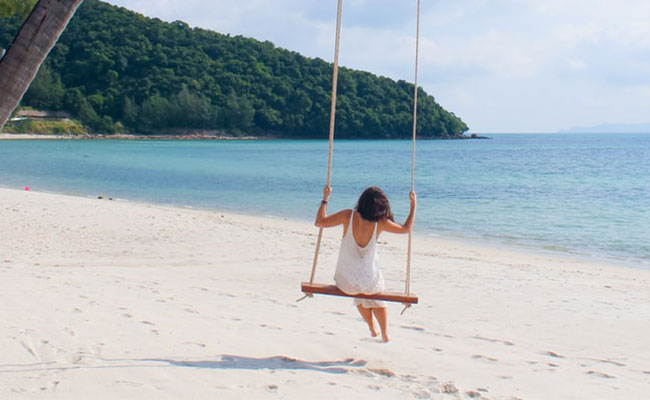
Koh Samui
Where to Stay in Thailand
If you're visiting Thailand for two or three weeks, then you're probably torn over which parts of the country to visit.
There are so many islands to consider, and so many areas of the country that boast beautiful scenery and interesting culture.
The key is to strike a balance between not staying in one place too long and not visiting places too quickly – otherwise you don't get to really explore and appreciate them.
My general advice for a holiday would be to visit three areas of the country:
Bangkok
Some might say you should avoid Bangkok because it's really busy, hot, and doesn't have a beach.
In my opinion, if you're going to visit Thailand, then you should experience Bangkok.
It's actually a good place to arrive and spend a few days.
Because if you've had a long haul flight, then you will most likely be landing in Bangkok, so you can catch a taxi to your hotel and get some rest, rather than waiting around for a connecting flight.
Moreover, if you're flying across a couple of time zones, then you will be jet-lagged.
I'd rather get over my jet lag in Bangkok and be fully refreshed for visiting the beaches and islands, than sleeping half the day away at a beautiful beach location.
So two or three nights in Bangkok is ideal.
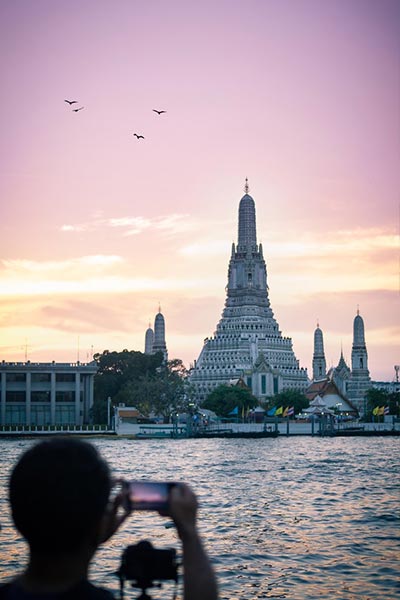
Wat Arun is a Buddhist temple in Bangkok Yai district of Bangkok.
If you arrive in the afternoon on the first day, then you can hang out at the hotel, maybe visit a market and grab something to eat, and then get some sleep.
You're probably going to sleep in late, or wake up early the next day and then want to sleep again in the afternoon to get over your jet lag.
You'll then have one more full day where you feel more energetic and can visit the Grand Palace, maybe a floating market, and do a bit of shopping.
Another option is to spend a couple of days in Bangkok when you arrive, and then come back to Bangkok for a day before you leave.
The reasoning behind this is that you might want to do some shopping before you go home, but you might not want to do that shopping when you arrive because you would have to carry the stuff around with you for the rest of your holiday.
This really depends on how much shopping you plan on taking home.
If you have more time on your hands in Bangkok, check out my list of things to do in the Big Mango.
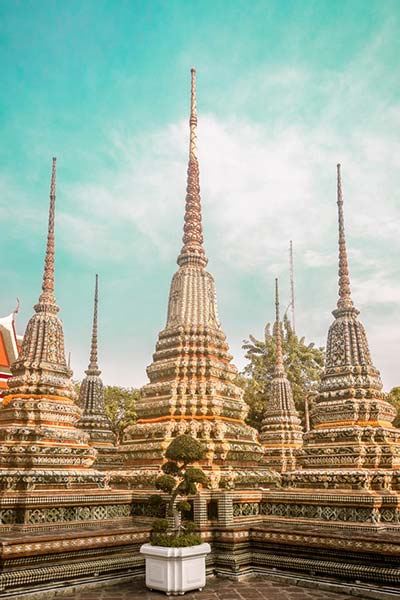
At the Grand Palace, Bangkok
Staying on Thailand's Islands
It goes without saying that the Southern islands have the best beaches.
There are some good beaches that you can get to in a couple of hours from Bangkok, such as on Koh Larn and Koh Samet.
However, if you choose to go to Phuket or Koh Samui, from that base you will be able to visit a number of other islands too.
You also have a good selection of beaches on those islands.
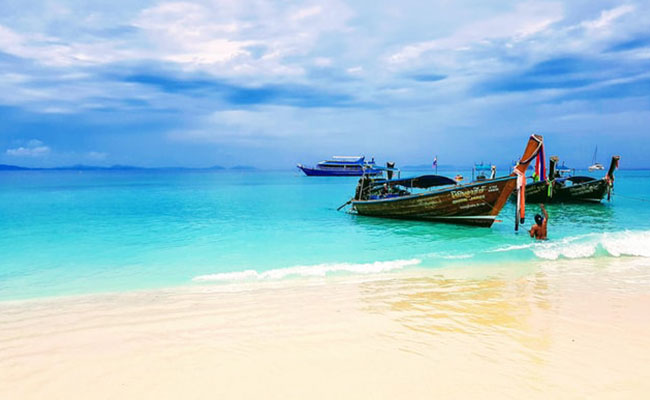
The Phi Phi Islands are an island group in Thailand, between the large island of Phuket and the Straits of Malacca coast of Thailand.
Yes, these are the more commercial islands, and while there are more intimate and less touristy islands, pretty much all of the best beach locations have a lot of visitor traffic in high season.
Furthermore, the more remote islands aren't always that practical for families, and some lack good accommodation and things to do, particularly for kids.
If you come for a second or third holiday, then you might want to explore some of the less popular but more beautiful islands.
But if this is your first and potentially your only trip, then I recommend going to Phuket or Koh Samui, and from these islands taking boat trips to see other beautiful islands and beaches.
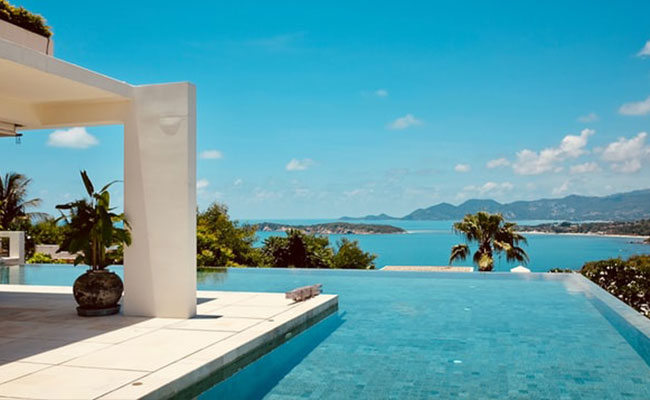
Located a short drive from Choeng Mon Beach in Koh Samui, Samujana boast luxurious villas.
The North (Chiang Mai)
You might choose to simply stay down south and enjoy the beaches, and I wouldn't blame you. I'd happily sit on a deckchair for the entire holiday, to'ing and fro'ing from the massage spot, gym, and bar.
But if you want a deeper insight to the country and to see another side to Thailand, then the North is a good place to visit.
Chang Mai in particular is very popular, Westerner-friendly city – surrounded by beautiful nature.
You can base yourself in Chang Mai for a few days and go off for trips to Doi Intanon National Park, Doi Suthep Temple, the Elephant Nature Park, and enjoy the good food and night markets of the North.
Again, like Bangkok, a few nights here will be adequate.
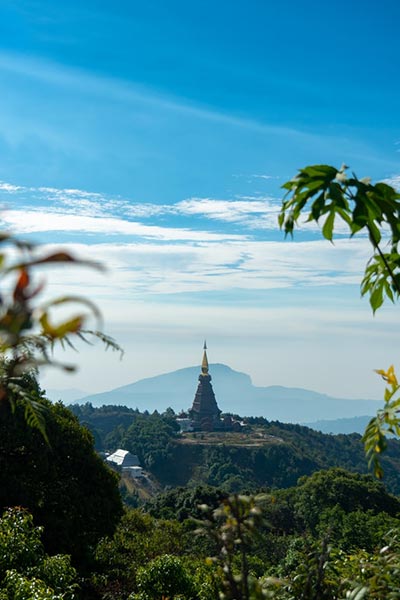
Doi Inthanon, in Chiang Mai, is the highest mountain in Thailand.
Got an Extra Few Days?
If you find yourself back in Bangkok and you've got an extra few days to spare, then you might go to Koh Samet for a couple of nights, which is three hours from Bangkok and a 30-minute ferry.
Samet is not far from the aptly named Sin City of Pattaya. Indeed, if you are a single man or with a group of friends, you might like to see the bright lights of Pattaya, which is a beach resort too, and only a couple of hours drive from Bangkok.
Probably not the smartest idea to take your wife or girlfriend there. Unless they aren't bothered by go-go bars and hookers.
Visiting, in Summary
Those who have lived in Thailand for a while, or visited on holiday a number of times, may poo-poo my suggestions and give you recommendations of places to go that are off the beaten track.
But that's because the more time you spend in Thailand the more you want to get away from the touristy areas and find more isolated places.
But generally, for a first holiday, you want to be in the thick of it and see the main attractions of the things other people have seen.
You want easy access and plenty of options. Trust me, I've been there, done it, and worn the t-shirt.
That being said, if you are traveling for three months or more and spending a month in Thailand, then you can visit these popular hotspots and then go off and visit some more remote places like these.
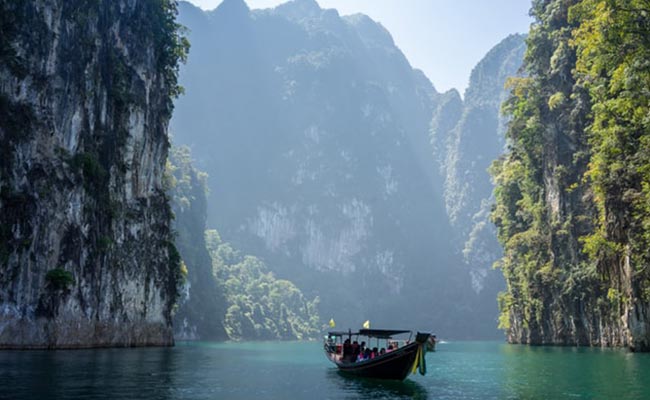
Khao Sok is situated on the mainland between Phuket, Krabi, Khao Lak and Koh Samui.
When to Visit Thailand – Weather
The weather in Thailand does vary by region at different times of the year.
Generally speaking, you can follow this guide:
- Dry Season: March-May
- Rainy Season: May-October
- Cool Season: November-February
For a place by place breakdown, check out my extensive weather guide.
Accommodation for Different Budgets
Depending on whether you're a solo backpacker or a family of 4 on the holiday of a lifetime, accommodation requirements vary for different types of traveler.
Luckily, Thailand generally has something for everyone in all corners of the country.
From package holidays to hostels and mid-range hotels, check out my booking recommendations here.
Also consider that if you aren't too fussed about plush accommodation, you can rock up and book in at what's available.
During high season you won't be able to be too picky, as the nicer rooms and bungalows get booked up in advance.
But let me just say that I have never not been able to get a room somewhere in any of Asia.
And you're planning on catching a train or a bus, check out 12GO here.
Pre-Holiday To-Do List
1. Visa
The large majority of countries are subject to a visa exemption. This means that when their citizens enter Thailand they get a stamp that permits a stay of 30 days.
If you are coming towards the end of your trip and you think you might want to stay longer, you can visit an immigration office and extend this stay by another 30 days for 1,900 Baht.
However, in the interest of good planning, if you think that extending your stay is a good possibility, you should consider getting a single entry tourist visa, which gives you a 60-day stay in the country.
A multiple entry tourist visa is a six month visa, but you can only stay for 60 days at a time. You then have to leave the country and come back into activate a further 60 days.
Again, the multiple entry option can be extended for 30 days by going to immigration and paying the aforementioned fee.
Generally speaking, those coming for a two or three week holiday won't need to worry about a visa.
2. Travel Insurance
It goes without saying that you will need travel insurance.
Not only does travel insurance protects you against hospital bills if you fall ill or have an accident, but some policies will also cover you against cancellation of your flights or lost baggage and stolen goods.
Travel insurance is one of those things that many people forget to do in the midst of all the excitement of planning.
So I suggest this is something that you do early on in your trip planning process to make sure that you are covered from the moment you leave your house.
I don't want to make you fear going on holiday, but at the end of the day it gives you peace of mind.
See my travel insurance recommendations here.
3. Suitable Backpack/Holdall
Another thing that people often don't consider until the last minute, mainly because they have an old suitcase or holdall in the attic that they always use, is suitable luggage.
Consider what type of holiday you are taking:
- Are you going to be traveling on trains and buses?
- Are you going to be trekking or diving?
- Or are you going to be staying in luxury hotels and taking private cars everywhere and having someone to hold your back?
You won't want a big clunky suitcase if you are taking an overnight train from Bangkok to Chiang Mai.
And if you are going trekking , then you may need to consider a second bag in addition to your main backpack; one that is detachable and can be taken with your essentials on the trek.
In fact, a second, smaller backpack is advisable for everyone visiting Thailand.
You will need something practical to carry around with you during the daytime.
Although, when out shopping and in crowds you should wear backpacks on your front so that you can't be pick-pocketed, particularly in Bangkok.
I'm not trying to scare you here, the same goes for any major city you are visiting, including my hometown, London.
4. Mosquito Spray
You can find mosquito spray in Thailand at pretty much every convenience store, and is likely to be cheaper than in your home country.
However, if you have sensitive skin, you may want to look for a higher quality brand in your home country before you leave.
Your mosquito spray should contain DEET.
Note that the higher percentage of DEET does not represent how effective it is but how long it lasts:
Products containing lower concentrations of DEET are as effective as those with higher concentrations, but for shorter periods of time. On average, products containing 100% DEET will be effective for 9.5 hours, 30% DEET for 6.5 hours, 15% DEET for 5 hours, 10% DEET for 3 hours and 5% DEET for 2 hours (source)
5. Vaccinations
There maybe some vaccinations for you to consider before you visit Thailand.
These can usually be done by your regular Doctor, and even at some pharmacies. There's a full list here.
6. Changing Money
People often change up lots of money before they go on holiday, thinking that they will run out quickly, but this is not a wise thing to do.
It isn't a good idea to travel with loads of money on you, just in case you lose it.
Moreover, I usually get a better exchange rate when I arrive in Bangkok than I do back home, anyway. You will find a number of exhange places in central Bangkok.
If you want to do it at the airport, don't do it at the exchange booth inside the arrivals area, do it when you come out into the main foyer, as you tend to get better rate there.
You might choose to change up to $300 before you leave, depending on how many people are traveling.
That being said, it is expensive to withdraw money in Thailand- because you get charged for the local withdrawal and charged by your bank back home for the international withdrawal.
This could end up costing you $5-6 dollars per withdrawal.
That said, this isn't really a big deal if you only make three withdrawals across the whole holiday.
Note that cash machines are generally limited to a withdrawal amount of 20,000 Baht per time.
If you do want to avoid fees, then consider finding a credit or debit card provider that doesn't charge for international transactions, and/or has low rates on withdrawals.
You might also want to consider something like the Revolut Card.
This is a multi-currency prepaid card, which allows you to pre-load money and spend abroad.
One I would recommend is making a plan before you leave, detailing how much money you plan to take in cash, both money changed into Thai Baht and money in your native currency to change up in Thailand.
And then consider a cost-effective strategy for withdrawing money and spending money on your cards.
7. Health Insurance
If you have travel insurance then you aren't likely to need this, but for those with specific conditions, or who want specific extra cover – perhaps for an extended period, health insurance may be a requirement.
Cigna is a reputable and reliable health insurer for those living and traveling in Thailand.
You can get a quote using their 2-minute quote page by clicking here.
Streaming & Secure Internet Browsing
If you want to watch Netflix, Amazon Prime, or Disney + on holiday, you will need to bypass GEO restrictions to watch some of the content.
You can do this with a VPN. A VPN is also a good idea when using WIFI in airports and cafes, particularly if you are going to be logging onto personal banking or accessing other sensitive information from your laptop, phone or tablet.
I have a post with more details on this. Read the VPN post here.
Planning Your Trip, In Summary
Bookmark this guide, or print it out and make planning your trip to Thailand easy.
If you follow along section-by-section and tick things off as you go, you'll have all the important bases covered.
Here's an overview of what we've covered in this guide:
- Decide where to stay: Bangkok, Islands, Chiang Mai (North) and places to visit
- Check the weather before deciding on your travel dates
- Research accommodation, based on your budget
- Do you need a visa?
- Get travel insurance
- Get a suitable backpack/holdall
- Get mosquito spray
- Get vaccinations
- Change money
- Consider health insurance
- Get a VPN to bypass GEO restrictions on Netflix, and safe browsing
Proper planning makes for a successful outcome, or at least so my mother said.
Have a great trip!
Last Updated on
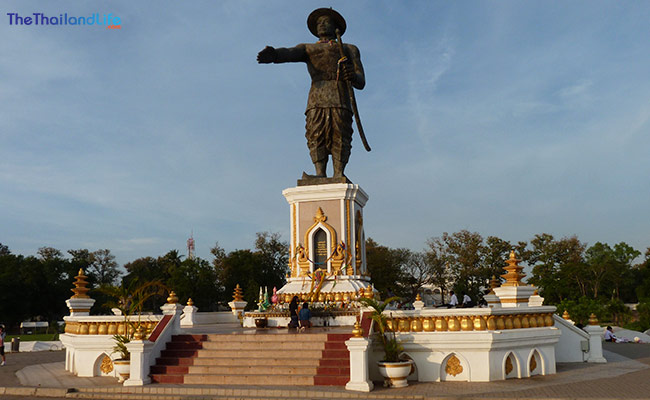

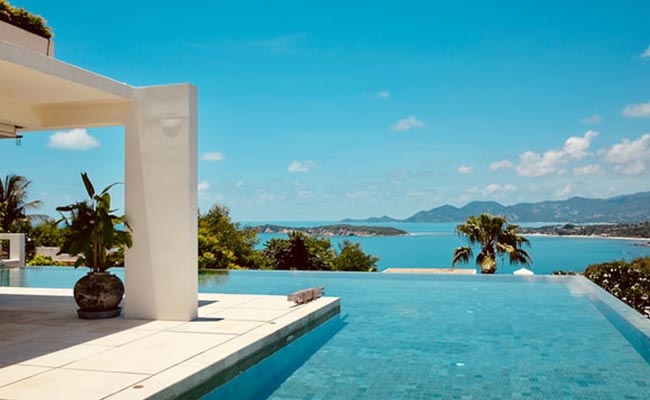
Raymond Richards says
If I am allowed to travel again to Thailand I usually get a non immigrant O visa from Hull in uk, this gives me 90 days stay, I am thinking about staying 1 extra month so can I travel with a 90 day O visa & extend at Jomtien immigration for the extra month or will I have to do a border run which I don't want to do because it's plain dangerous? also is it best to book the airline ticket for the 4 months rather than pay the extra cost same to change from 3 months to 4 months.
I'm Retired, 75 yr old male from UK.
Thanks.
May 14, 2020 at 12:26 am
Claire says
May 14, 2020 at 11:25 pm
TheThailandLife says
May 15, 2020 at 8:23 pm